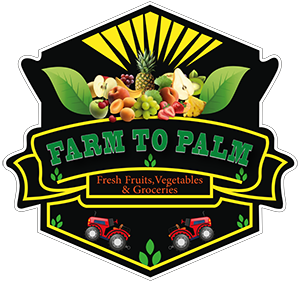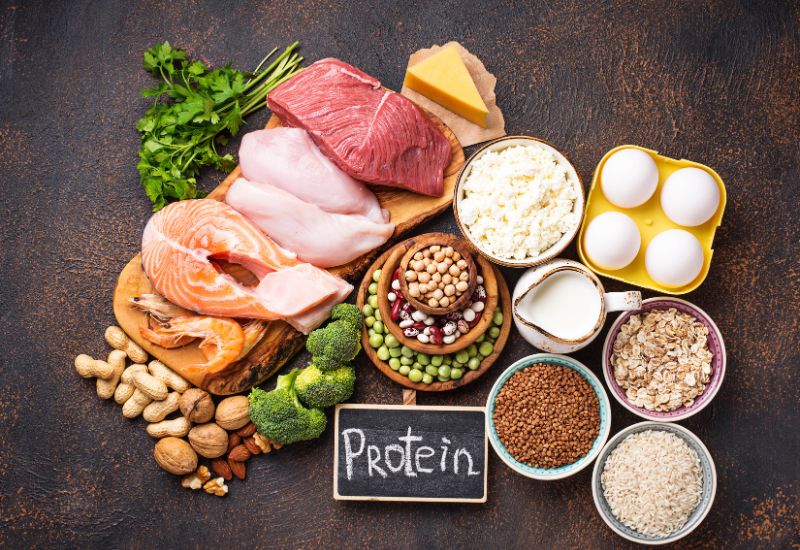Eggs are commonly recognized as an exemplary protein source due to their affordability, versatility, suitability for vegetarians, and provision of six grams of protein per large egg. Quite impressive, wouldn’t you agree?
However, some might grow weary of consuming numerous hard-boiled eggs. It is now opportune to expand one’s culinary repertoire by exploring alternative high-protein foods that offer a higher protein content per serving than an egg.
Protein in Eggs

Protein: 100 grams of eggs contain 13 grams of protein.
Eggs are a good source of protein. One large egg typically contains around 6-7 grams of protein. The protein in eggs is considered high-quality, containing all the essential amino acids the body needs.
Foods rich in protein
Here are 22 foods that have more protein than eggs:
Chicken breast
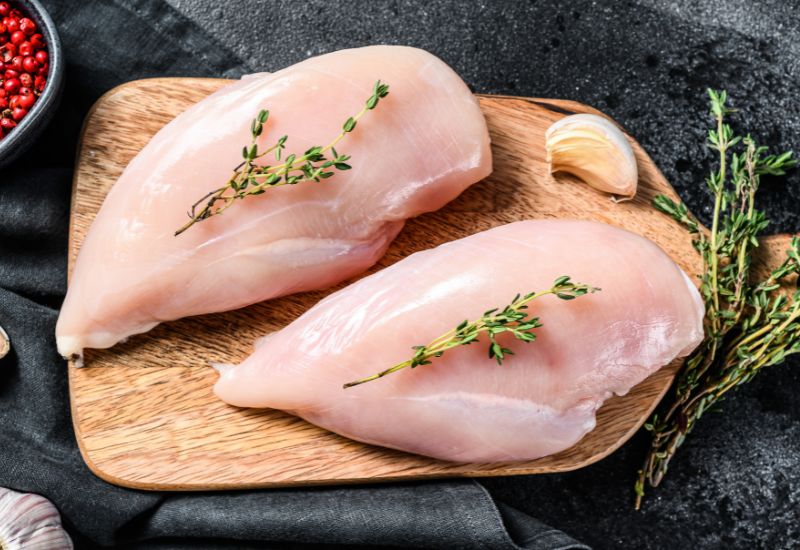
Protein: 100 grams of Chicken breast contains 31 g grams of protein
Chicken breast is an excellent source of protein. On average, a 3-ounce (85-gram) serving of cooked chicken breast provides about 26 grams of protein. It is a lean source of high-quality protein, making it a popular choice for many people looking to increase their protein intake.
Pumpkin seeds
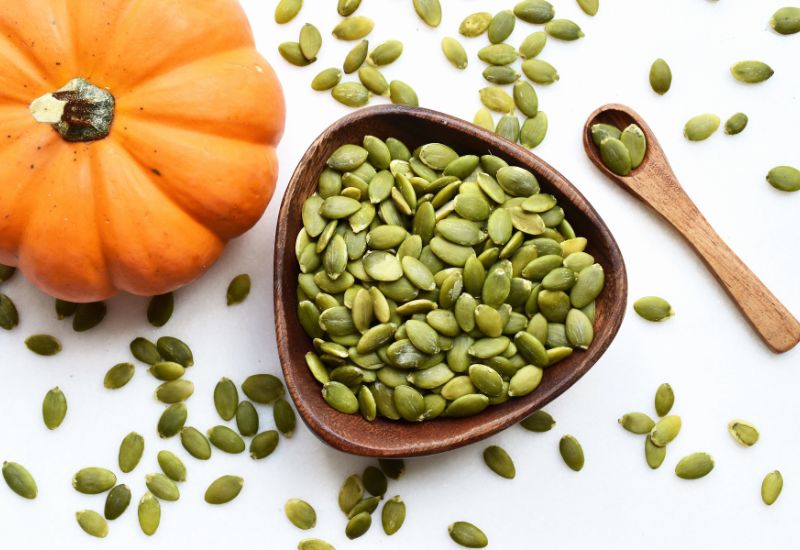
Protein: 100 grams of pumpkin seeds contain 19 grams of protein
Pumpkin seeds are packed with nutrients such as calories, fats, proteins, and fiber. In a 100-gram serving, they provide approximately 446 calories, 19 grams of fat, 18 grams of fiber, and 19 grams of protein.
These seeds are rich in polyunsaturated and monounsaturated fats, beneficial for health. Additionally, they are a good source of vitamins B1, B2, B3, B5, B6, B9, C, E, and K, as well as minerals like calcium, iron, magnesium, manganese, phosphorus, potassium, sodium, and zinc. Incorporating pumpkin seeds into your diet can be a nutritious choice.
Almonds

Protein: 100 grams of Almonds contain around 21 – 22 grams.
Almonds, renowned for their nutritional value, are a versatile source of plant-based protein. A 30-gram serving of almonds, almond butter, or almond flour provides 6 grams of protein, making them an ideal snack to sustain energy levels throughout the day.
Among tree nuts, almonds stand out for their high content of essential nutrients. In a 30-gram serving, almonds offer the highest amounts of vitamin E (7.7mg), calcium (80mg), and riboflavin (0.3mg).
Notably, almonds are naturally free of sodium and low in sugars, further enhancing their appeal as a wholesome snack option for individuals following plant-based diets or seeking a protein-rich alternative.
Chickpeas
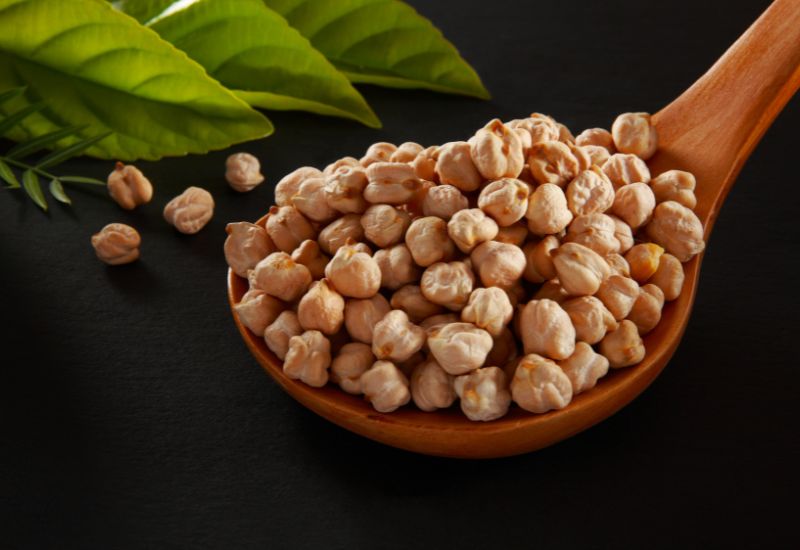
Protein: 100 grams of Chickpeas contain 19 grams of protein
Chickpeas represent a valuable plant-based protein source, particularly beneficial for individuals adhering to a vegetarian or vegan diet. One cup (164 grams) of cooked chickpeas contains approximately 14.5 grams of protein, comparable to other legumes like black beans and lentils.
The protein content in chickpeas can promote satiety, thereby assisting in appetite regulation. Protein plays a crucial role in various aspects of health, such as weight management, bone health, and muscle strength.
Research suggests that chickpeas’ protein quality may be superior to other legumes due to their composition of all essential amino acids except methionine, rendering them an incomplete protein source. To ensure the intake of all essential amino acids, it is advisable to combine chickpeas with a whole grain rich in methionine, such as Quinoa.
Quinoa

Protein: 100 grams of Quinoa contains 16.5 grams of protein
Quinoa is a whole grain and a valuable plant-based protein and dietary fiber source. A one-cup serving of cooked Quinoa offers approximately 8 grams of protein and 5 grams of fiber. Distinguished from other plant-based proteins, Quinoa stands out as a complete protein, encompassing all nine essential amino acids crucial for human health that are not independently synthesized by the body.
Turkey

Protein: 100 grams of Turkey contains 29 grams of protein
Turkey is recognized as a valuable source of protein, a vital nutrient essential for muscle development and maintenance. Proteins play a crucial role in cell structure and the transportation of nutrients throughout the body.
Furthermore, a diet rich in protein has been associated with potential benefits for weight management by enhancing feelings of satiety. Just two substantial slices of turkey weighing 84 grams provide an impressive 24 grams of protein, equating to 48% of the Daily Value (DV).
Moreover, turkey presents itself as a potentially healthier option compared to red meat, as certain observational studies have linked red meat consumption to an elevated risk of conditions such as colon cancer and heart disease. However, it is essential to note that some research suggests that processed meats, rather than red meat itself, may adversely affect health.
Greek yogurt

Protein: 100 grams of Greek yogurt contains around 12 – 16 grams of protein.
Greek yogurt is renowned for its high protein content, a crucial macronutrient essential for many biological processes, including immune system maintenance, tissue regeneration, and enzymatic reactions.
Protein requirements are individualized, yet a suggested intake of 0.54–0.9 grams per pound (1.2–2 grams per kg) of body weight is optimal for individuals engaging in physical activities.
A 7-ounce (200-gram) serving of Greek yogurt boasts 20 grams of protein, positioning it as a notable protein source.
Beyond its protein richness, Greek yogurt abounds in vital vitamins and minerals like B12, selenium, and zinc, each playing pivotal roles in fortifying overall health.
Zinc and selenium are imperative for robust immune function, while B12 is indispensable for red blood cell formation, nervous system integrity, and energy metabolism.
Peanuts

Protein: 100 grams of Peanuts contain 26 grams of protein
Peanuts are a valuable protein source, with their protein content constituting 22–30% of total calories. This characteristic makes peanuts an excellent plant-based protein option.
The primary proteins found in peanuts, reaching contracting, possess significant allergenic potential for specific individuals, potentially leading to severe and life-threatening reactions.
In summary, peanuts stand out as an exceptional plant-based protein source, although it is essential to note that allergic reactions to peanut proteins can occur in some individuals.
Salmon

Protein: 100 grams of Salmon contain 20 grams of protein
Salmon, known for its richness in high-quality protein, is a vital source of essential nutrients such as omega-3 fats and protein, which are crucial for a well-rounded diet.
Protein is an indispensable nutrient that serves various critical bodily functions, including aiding post-injury recovery, preserving bone health, and sustaining muscle mass during weight loss endeavors and as individuals age.
Recent studies suggest that for optimal health benefits, each meal should ideally contain a minimum of 20–30 grams of high-quality protein.
To put this into perspective, a 3.5-ounce (100-gram) serving of Salmon offers approximately 20–25 grams of protein.
Chia seeds
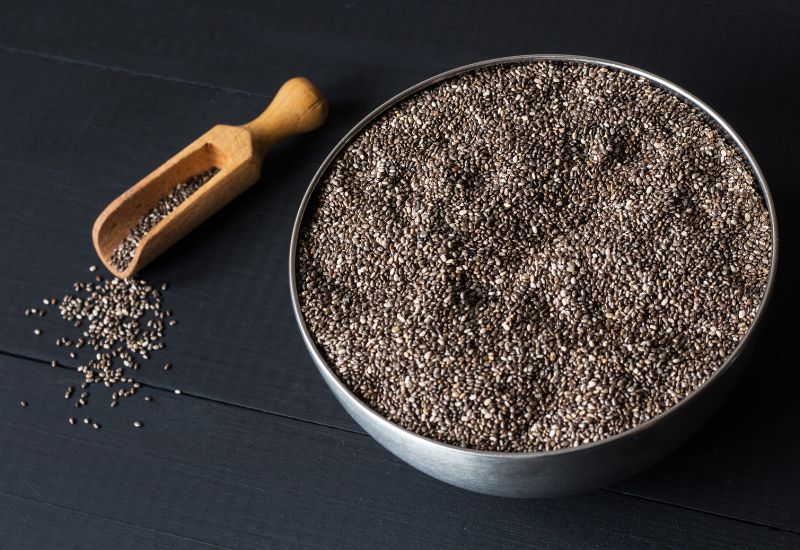
Protein: 100 grams of Chia seeds contain 17 grams of protein
Chia seeds are nutrient-rich, packed with fiber, omega-3 fatty acids, protein, essential minerals, and antioxidants. They can improve digestion, lower blood pressure, and help manage blood sugar levels.
With a protein content of 19%, chia seeds offer a protein level similar to other seeds but higher than most grains and cereals. A high protein intake aids in feeling full and reducing food intake.
These tiny seeds are unique because they contain all nine essential amino acids, making them a valuable plant-based protein source. However, they should not be the sole protein source for children.
Pork loin
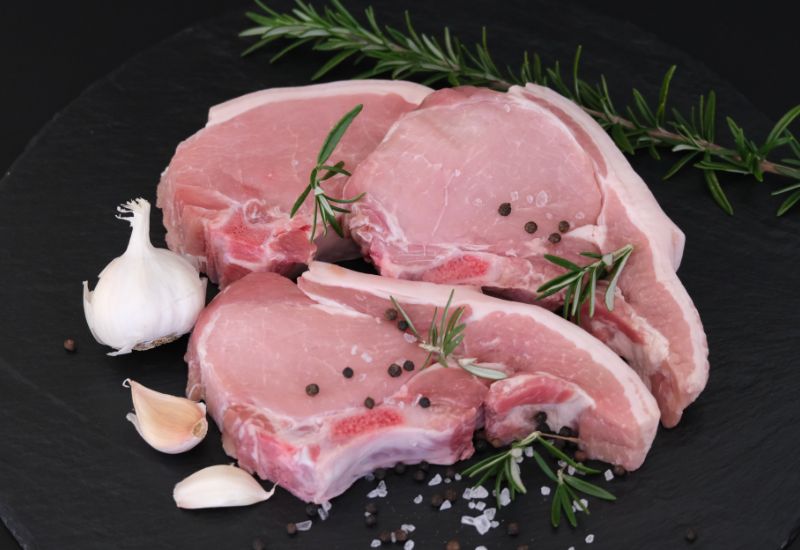
Protein: 100 grams of Pork loin contains 27 grams of protein
Pork loin is recognized as a valuable protein source, offering 22g of protein in a 3-ounce serving of baked pork tenderloin. Protein is essential for various bodily functions, including muscle growth and repair.
Additionally, pork contains vital amino acids necessary for overall health. Consuming adequate protein from sources like pork can help maintain muscle mass, support cell growth and function, and provide energy for daily activities. Including pork in a balanced diet can contribute to effectively meeting protein needs.
Black beans
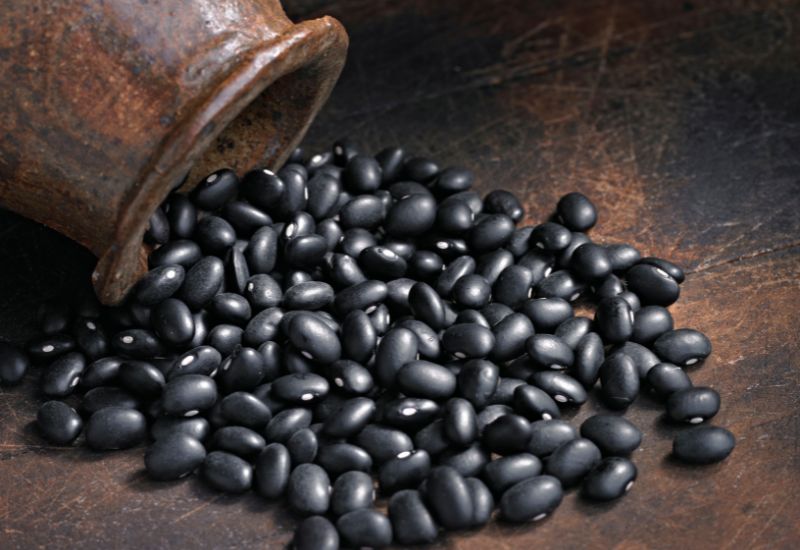
Protein: 100 grams of Black beans contain 21.6 grams of protein
Black beans are renowned for being an excellent source of protein, especially for individuals following a vegetarian diet. With 21.60 grams of protein per 100 grams, black beans provide a substantial amount of this essential nutrient. Protein is crucial for various bodily functions, including muscle repair and growth, enzyme production, and overall cell health.
Additionally, black beans’ protein content makes them a satisfying and nutritious option for those looking to increase their protein intake without consuming meat. Incorporating black beans into meals can be a delicious way to boost protein levels while enjoying their unique flavor and texture.
Bison
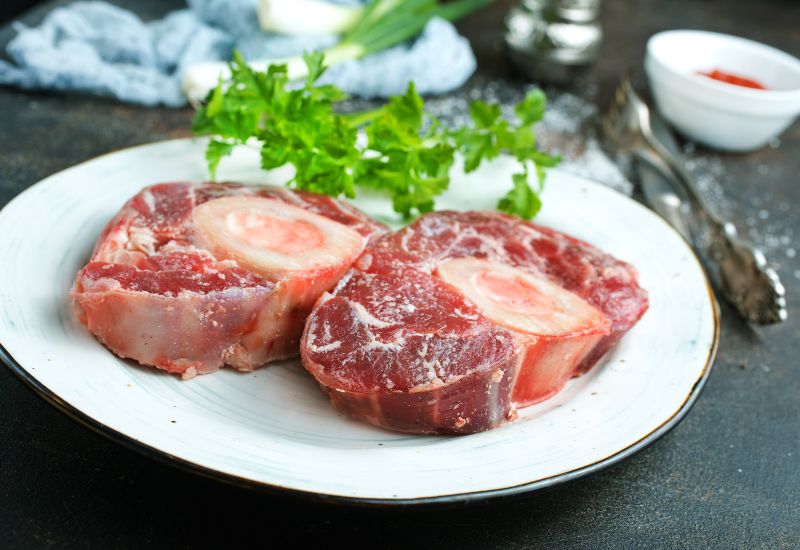
Protein: 100 grams of Bison contain 20 grams of protein
Bison meat is renowned for its high protein content, providing 20 grams of protein in a 100-gram serving. Proteins are essential nutrients that play crucial roles in the body, such as building and repairing tissues, supporting immune function, and aiding in enzyme and hormone production.
Bison meat is a complete protein source containing all 20 amino acids humans require. Additionally, it is rich in other beneficial nutrients like iron, magnesium, calcium, zinc, and CLA, which possess anti-inflammatory properties. Choosing bison meat as a protein source can be a healthy option due to its nutrient profile and favorable impact on overall health.
Sunflower seeds
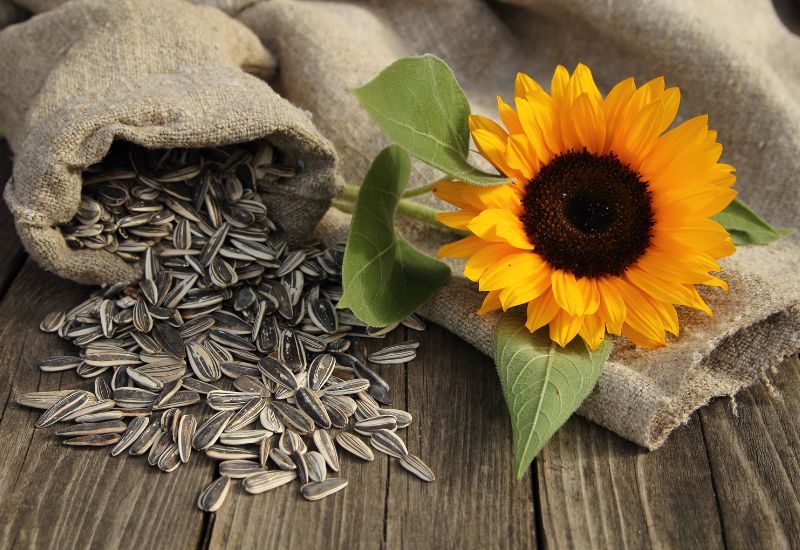
Protein: 100 grams of Sunflower seeds contain 21 grams of protein
Sunflower seeds are a great source of protein, making them a beneficial addition to your diet. Proteins are essential nutrients that play a crucial role in the growth, repair, and maintenance of tissues in our body. Sunflowers contain protein, contributing to muscle development, immune function, and overall health.
Consuming protein-rich foods, like sunflower seeds, can also help you feel full and satisfied, making it a valuable snack option. Additionally, proteins from sunflower seeds can be a part of a balanced diet that supports various bodily functions, promoting overall well-being and vitality.
Cheddar cheese
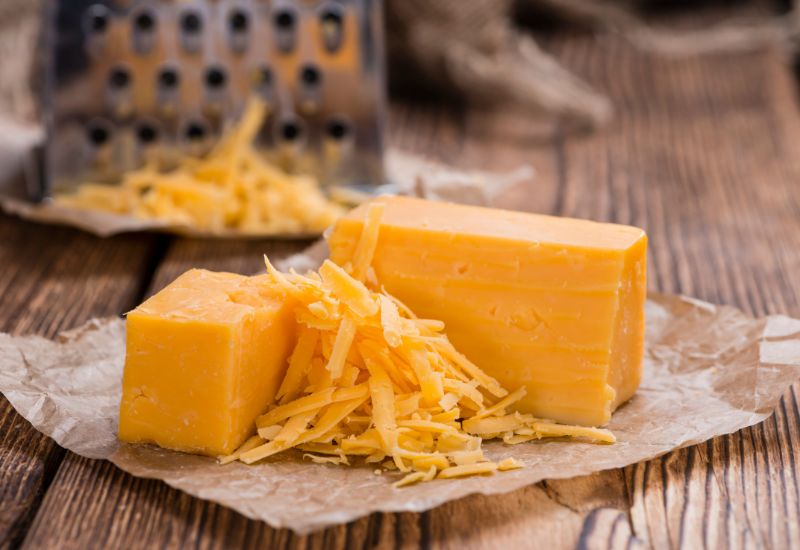
Protein: 100 grams of Cheddar cheese contains 25 grams of protein
Cheddar cheese is a flavorful addition to dishes and a good source of protein, with 7 grams per ounce. Protein plays a crucial role in the body, aiding muscle building, enzyme production, cell structure, and fluid balance. Incorporating cheddar into meals can significantly contribute to your daily protein intake.
Cheddar’s protein content adds to its satiation factor, making it a satisfying and nutritious option. Whether enjoyed in a melty quesadilla, creamy mac and cheese, or atop a sizzling burger, cheddar cheese provides both taste and essential nutrients like protein to your diet.
Peanut butter
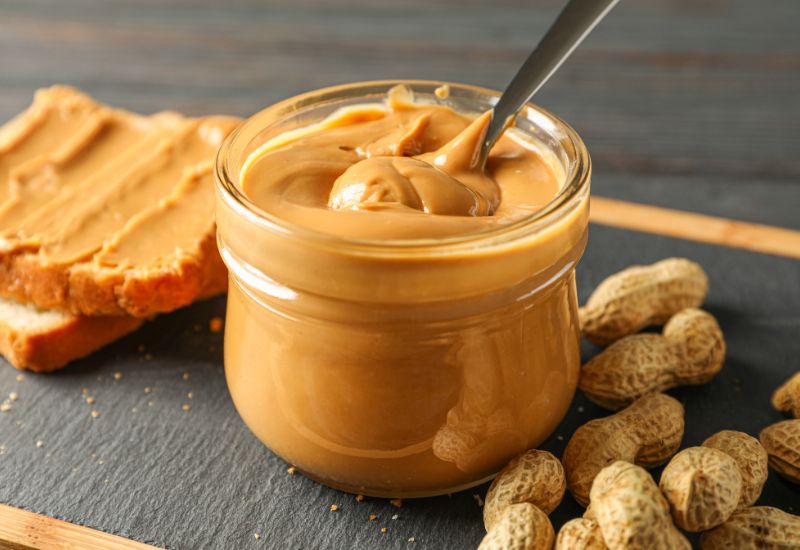
Protein: 100 grams of Peanut butter contains 25 grams of protein
Peanut butter is an excellent plant-based protein source, providing 25% protein content. Despite being low in the essential amino acid methionine, it remains an excellent protein source.
The protein in legumes like peanuts has been linked to potential health benefits, including longevity. A significant portion of the fat in peanuts is oleic acid, which is associated with improved insulin sensitivity.
With various vitamins and minerals, peanut butter is an excellent choice for vegetarians or those on a plant-based diet. It offers antioxidants like p-coumaric acid and resveratrol, which have been linked to various health benefits. Despite potential risks like aflatoxins, commercial peanut butter is a safer option to enjoy moderate amounts of this nutritious spread.
Tuna

Protein: 100 grams of Tuna contains 29 grams of protein
Tuna is a complete protein, containing all nine essential amino acids the human body requires but cannot produce independently. With approximately 90% of its calories derived from protein, canned tuna is a food rich in this macronutrient.
Its low calorie and fat content further enhances its nutritional profile. Beyond its protein content, tuna offers valuable stores of omega-3 fatty acids, an array of vitamins, including D, A, and B-12, and essential minerals like iron, calcium, and potassium.
Edamame beans
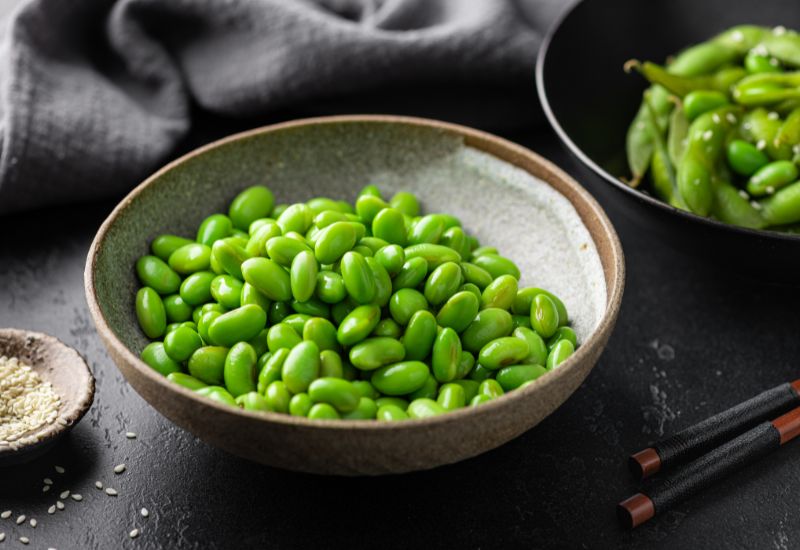
Protein: 100 grams of Edamame beans contain 11 – 14 grams of protein
Proper protein intake plays a vital role in maintaining optimal health. Individuals following a vegan diet or infrequently consuming high-protein animal products should be mindful of their daily dietary choices.
One notable concern concerns the relatively modest protein content in numerous plant-based foods. Nevertheless, there are some exceptions to this trend. Beans, for example, stand out as one of the premier sources of plant-derived protein. They serve as a foundational component in many vegan and vegetarian eating patterns.
To illustrate, a serving of cooked edamame weighing 160 grams yields approximately 18.4 grams of protein. Furthermore, soybeans represent a complete protein source. Unlike most plant-based proteins, soybeans supply all the essential amino acids the human body requires.
Rolled Oats
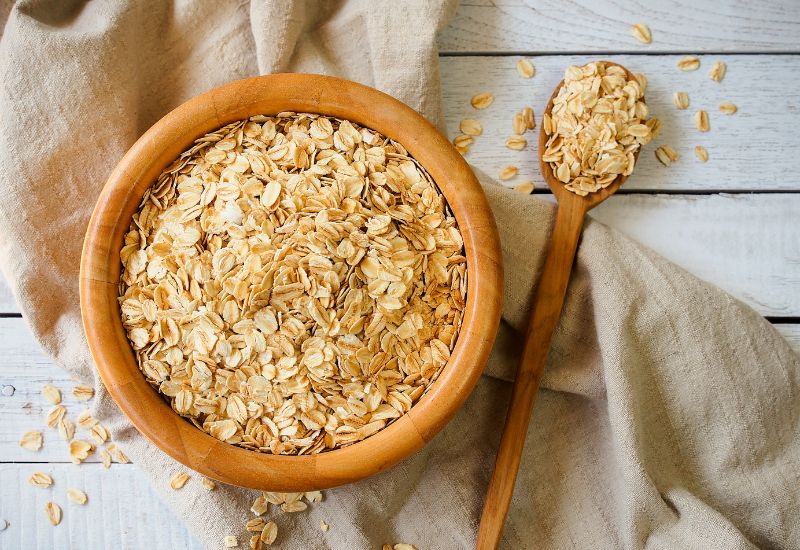
Protein: 100 grams of Rolled Oats contain 13.15 grams of protein
Oats represent a notable source of high-quality protein, constituting 11–17% of their dry weight, a percentage surpassing that of many other grains.
The primary protein in oats, comprising 80% of the total protein content, is avenalin. This unique protein is not present in any other grain but resembles proteins commonly found in legumes.
A secondary protein, avenin, shares similarities with wheat gluten. Nevertheless, uncontaminated oats are generally deemed safe for consumption by individuals with gluten sensitivity.
Tempeh

Protein: 100 grams of Tempeh contains 19 grams of protein
Tempeh, a soy-based food popular among vegans and vegetarians, stands out as a complete source of protein. It contains all nine essential amino acids for maintaining healthy bones and muscles. With 19 grams of protein in a 3-ounce serving, Tempeh provides a substantial amount of this vital nutrient.
Additionally, the isoflavones present in Tempeh offer cancer-fighting and antioxidant properties, further enhancing its health benefits. Whether steamed, sautéed, or baked, incorporating Tempeh into your diet can be a delicious and nutritious way to boost your protein intake.
Shrimp
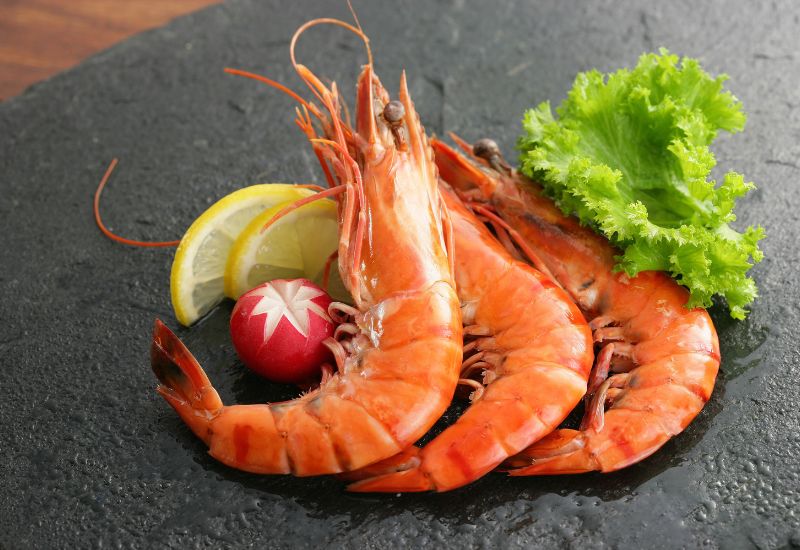
Protein: 100 grams of Shrimp contain 24 grams of protein
Shrimp is a rich source of protein, providing 24 grams per 100 grams. This high-quality protein content makes Shrimp an excellent addition to a balanced diet. Protein is essential for various bodily functions, including muscle growth and repair. Incorporating Shrimp into meals can help individuals meet their protein needs.
Despite being low in calories, fats, and carbohydrates, Shrimp is rich in protein. Additionally, the protein in Shrimp is complemented by vitamins and minerals, making it a nutritious seafood choice. Considering its nutrient profile, Shrimp is a valuable protein source that can contribute positively to overall health and well-being.
Seitan

Protein: 100 grams of Seitan contains 75 grams of protein
Seitan, a popular plant-based protein, contains approximately 17g per 2-ounce serving. This amount rivals animal-based protein sources, such as chicken breast. Compared to other plant-based proteins, Seitan offers more protein; for instance, 4g more than 1 cup of edamame, 7g more than 2 ounces of firm tofu, and 6g more than 2 ounces of Tempeh.
Despite being an excellent protein source for vegetarians and vegans, Seitan is an incomplete protein lacking essential amino acids like lysine. Varying protein sources throughout the day ensure a balanced intake of essential amino acids.
In summary, eggs are an excellent protein source, yet exploring alternative high-protein foods can bring variety to your diet. Numerous options are available, from chicken breast with 31g of protein per 100g to nutrient-packed pumpkin seeds with 19g of protein.
Consider incorporating foods like almonds, Quinoa, Greek yogurt, Salmon, black beans, or chia seeds, each offering substantial protein content. Visit Farm to Palms supermarket today to discover a wide range of high-protein foods that can help diversify your meals and support your health and fitness goals.
